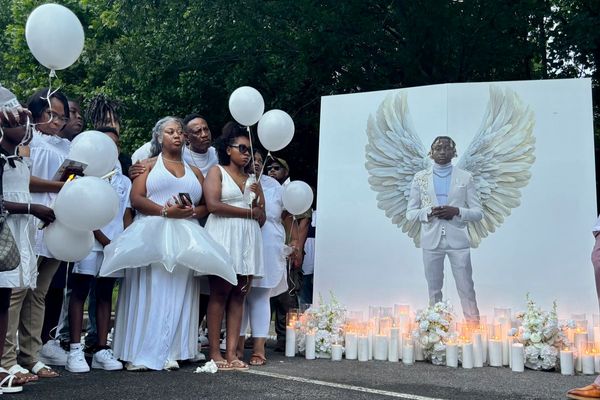Ruby Bradley entered the U.S. Army as a surgical nurse in 1934. She left as the most decorated woman in military history — but it wasn't an easy path.
Just three weeks after the Japanese military bombed Pearl Harbor on Dec. 7, 1941, Bradley (1907-2002) found herself as a prisoner of war. Bradley, who ran a U.S. Army hospital in the Philippines, was held along with other other staffers and patients there. She was just 34 years old.
But she found strength in helping others. The Japanese military transferred her to an internment camp in Manila in 1943. And there, she lost 24 pounds from her 110-pound frame after giving her food rations to children. She used the extra space in her now-baggy clothes to smuggle medical supplies into the camp. "I was a pretty good thief," she quipped.
Thankfully Americans liberated the camp in February 1945. During her 37 months of captivity, though, she assisted in 230 major operations and the delivery of 18 babies.
"Colonel Bradley retired in 1963 as the most highly decorated woman in the history of the United States Army, with 34 awards and decorations, including two Legion of Merit medals, two Bronze Stars, the Korean Service Medal with one silver and two bronze stars, and the Red Cross's prestigious Florence Nightingale Medal," wrote Nancy Polette in "Angel in Fatigues: The Story of Colonel Ruby Bradley."
Work And Train Hard To Succeed Like Ruby Bradley
Bradley's life was one of finding a need and filling it.
She grew up on a farm in Spencer, W.Va. After two years of college, her first job was teaching all eight grades in a one-room schoolhouse during the 1920s. It was the Great Depression. And she felt for her often poor and hungry students. She'd bring them extra food.
But she yearned for more of a challenge. She spent a day with her sister, a nurse at Walter Reed General Hospital in Washington, D.C. Bradley fell in love with all the details to help the suffering. She aimed to be a top-flight surgical nurse. Philadelphia General Hospital accepted her in 1930. She worked or studied from 7 a.m. until midnight.
"Her good-natured, easy smile, her skills, and her gentleness with patients made her a favorite," wrote Polette. "But the desire for adventure was too strong and she followed her sister into the Army in 1934 as a Second Lieutenant at Walter Reed, where its 1,225 beds were usually full."
Every surgeon learned of Bradley's skill. During procedures, she immediately handed over sterilized instruments or material to stop bleeding when needed.
Calmly And Creatively Handle Crises
Bradley's big break would also test her empathy under pressure.
In January 1940, Bradley sailed to Manila. The military assigned her to a hospital on the island of Corregidor in the bay. There she worked four-hour days and eight-hour nights. She again became a favorite of the surgeons and the patients.
Bradley then moved to Baguio in February 1941. She started as chief nurse and surgical assistant. Right after the Pearl Harbor attack in early December, Japanese planes strafed and bombed Baguio. The wounded came flooding into the camp's hospital. For two weeks, patients were treated when they and the staff weren't hiding in shelters during attacks.
After assisting in 37 operations on the morning of Dec. 23, Bradley helped pack supplies. They were loaded with patients into vehicles and wagons to flee into the hills. But passage was impossible.
"The Japanese told us that if anyone escaped, five people would be shot," Bradley recalled at a White House commemoration of the 50th anniversary of V-J Day (Victory Over Japan) in 1995. "We smuggled in drugs and surgical instruments and three days after surrender we did an appendectomy, and the Japanese thought it was wonderful that we could do all this without instruments."
It took creativity. Bradley used a tea strainer and gauze to anesthetize a pregnant woman with ether who went into labor. When soap ran out, they made their own with lye from wood ashes mixed with fats. "I used to tell everyone to roll with the punches," she said. "When faced with worms, say 'Aha! Protein! I will eat for the good of my country.'"
Develop The Motivation To Go Beyond The Call Of Duty
That's not to say Bradley avoided all pain.
After being transferred to the Santo Tomas internment camp in Manila in September 1943, several patients died every day. They couldn't endure the conditions. The POWs lived on half a cup of rice in the morning and another at night. Bradley shared hers with children who would otherwise have cried from hunger.
After the liberation by American troops in February 1945, Bradley returned to the U.S. She earned the title of captain and then major. And from 1946 to 1950, she served as head nurse at hospitals from Richmond, Va., to Cocoa, Fla. In 1949, she earned a B.S. in nursing administration at the University of California, Los Angeles.
"Smart and tough, Bradley often drew on the lessons she had learned under fire and during her captivity, where she earned a reputation as one of the most durable and reliable women in camp," Elizabeth Norman, author of "We Band of Angels: The Untold Story of the American Women Trapped on Bataan," told IBD.
In July 1950, Bradley took over as chief nurse for the 171st Evacuation Hospital during the Korean War. The facility's position required constantly shifting as the front lines changed. In November, the North Korean army, backed by 100,000 Chinese Communist troops, poured over the 38th Parallel dividing the North from the South. The 171st stood in their path.
"Bradley sent her subordinates out on a plane with the first round of evacuees and stayed to supervise the withdrawal of the rest," said Norman. "She was the last to jump aboard just before her ambulance exploded from an enemy shell."
Bradley: Prioritize Serving Others And Remain Humble
In 1951, Bradley was named chief nurse for the Eighth Army. She supervised 500 nurses throughout Korea. When she left in 1953, she was the first woman to be given a full-dress honor guard ceremony.
She rose to colonel in 1958 (only the third woman in Army history to achieve this rank). Additionally, she served as head nurse at a number of Army hospitals. Finally, she retired in 1963.
Bradley ultimately earned more medals, citations and awards than any woman in U.S. Army history.
Bradley never married. And she spent the next 17 years supervising a private-duty nursing service in Roane County, W.Va.
In 1954, Ralph Edwards' classic TV program, "This Is Your Life," featured her. But she told a reporter she never thought of herself as anyone special. "I want to be remembered as just an Army nurse," she said.
Bradley passed away in 2002 at age 94. She was laid to rest in Arlington National Cemetery, with a firing party of seven sounding three volleys in her honor, the flag-draped coffin escorted by six horses to the grave site.
Colonel Ruby Bradley's Keys
- Nurse for American prisoners of war in the Philippines during World War II, then chief nurse for an evacuation hospital during the Korean War.
- Overcame: Lack of medicines and surgical tools.
- Lesson: "Freedom is not free. You've got to fight for it."







